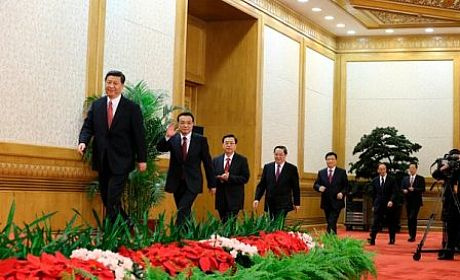Do Not Expect Political Change in New China

How is power structured in China and how are political elite alternated in political positions?
China's communist party plays the most significant role in the administrative structure of this country. There is a consultative assembly with 32 members which holds meetings several times during the year and decides about the most important issues of the country. These decisions are referred to the Party Congress. After studying these decisions, the Party Congress issues its final vote. Therefore, there is an organized and systematic process for changes in policies and if China’s senior officials are to be changed. Thus, China's policies usually do not undergo severe and sudden changes.
Furthermore, the majority of this country's officials gradually climb the ladder from the lowest position to the highest ones, as the majority of China's officials were formerly deputies of their current positions. Therefore, the directors of the country are selected from among the successful deputies of the same offices. Due to this reason, the administration of the country is not dependent on the personal opinion of individuals and is not faced with intense changes. This change rather follows the opinion of an assembly which pursues general policies. For example, the person who is to replace President Hu Jintao is an individual who has been vice president for more than five years. Therefore, he is well aware of all policies of the country and recognizes all the challenges and difficulties. He knows all the senior officials and, thus, can work with this system. Neither the policies, nor the officials are changed outside the normal trend of the decision-making process.
The role of the people is very important in the modern era. How are the people of China involved in determining their leaders?
The people usually shape the Party Congress, which has about 2,500 members, by choosing the representatives of the Party Congress and also by participating in party meetings and choosing representatives from different cities. These 2,500 individuals are present in various commissions which study different issues of the country during the year.
How different is the new generation of Chinese leaders from the previous ones? You mentioned that there is a fixed structure, but some believe that the leaders of the new generation have, to some extent, distanced themselves from communism and traces of imperialism are gradually being seen in this generation. How close is this idea to the reality, in your opinion?
In my opinion, such statements made with regard to China are due to lack of information about the administrative structure and the existing realities in this country. Besides, the US and Europe usually attempt to show that China is unstable and has no foundation for its policies and is faced with various challenges. Vast campaigns are undertaken in this regard. These types of campaigns are also constantly started with regard to Iran. But this is not the reality inside the country.
The other point is that what is proposed today based on the idea that the new generation of leaders in China is going to give more freedoms to the people and seriously follow privatization, began ten years ago. Right now and compared with thirty years ago, political freedom and freedom of press exists in China to some extent. But the Chinese, based on their beliefs and policies, never believe in unlimited freedoms as in the West and will not render such freedoms to their people.
Will there be a change in China’s policies with regard to Iran or the US?
Such changes will at least not happen in the near future. The reason is that these changes occur when China's research centers prepare reports and make recommendations to the government and the consultative assembly and convince them to change their policies. For example, when the Chinese decided to annul the law of having only one child, various research reports were sent to the consultative assembly with enough reason to state that this policy, despite being appropriate at a certain time, was not suitable for the present time. One year after receiving these reports and negotiating in the consultative assembly, this law was annulled. Therefore, it is not such that these changes happen overnight with one man's decision to issue a decree that certain policies should be annulled from then on. Hence, if changes are to be made in the foreign policy of this country, they have to pass the usual stages which are time-consuming.
The fact is that westerners try to show a shaky, unstable, and permanently-changing face of China and propagate this idea under different circumstances. This is while it seems that a very cohesive and strong structure makes decisions in China. Some of these decisions may not be correct, but they are certainly not spontaneously made by one individual.

